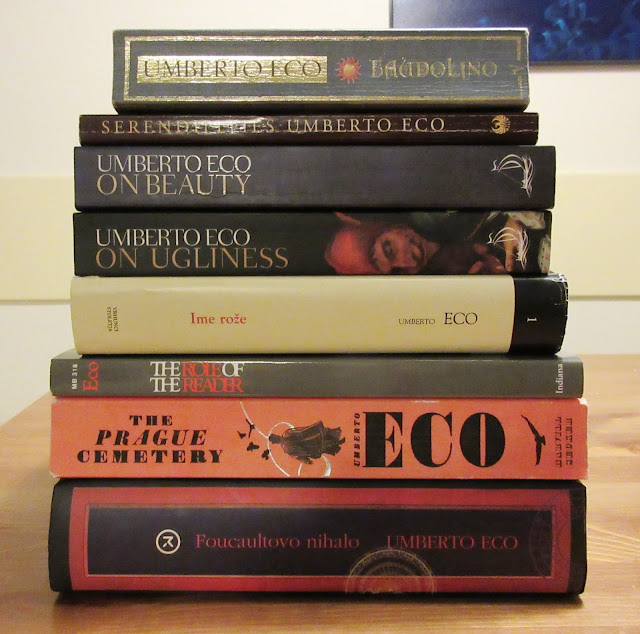Thank You, Master
“Books are not meant to be believed, but to be subjected to
inquiry. When we consider a book, we mustn’t ask ourselves whet it says but
what it means.”
Umberto Eco, The Name of the Rose
I was ten
when I first heard of
Umberto Eco. It was a radio broadcast about the Slovenian translation of The Name of
the Rose we were listening to
at lunchtime on a Saturday. I was too young when I tried reading Foucault's Pendulum so it was no wonder I failed twice. Instead I read
The Name of the Rose and quite enjoyed it. At fifteen I
read Foucault’s Pendulum
and it became my favourite book. I read it again at thirty and it was a different book. I think
I'll read it again sometime just to see what happens. Will it still be different? I hope so.
In my local
library I stumbled upon
The Mysterious Flame of Queen Loana, which I rather liked and found at time
quite witty. For example when the hero's wife asks him to bring some flowers from the market and he
returns with a jar containing dog's testicles in formaldehyde and no
flowers. I bought
Baudolino in a bookshop on Frankfurt Airport and read it all the way to Washington. In art
school I enjoyed his books On Beauty and On Ugliness. Part of our reading was How to write a Thesis and there are still a couple of smileys drawn in
red pencil on the margins. I was taught not to write and highlight too
much in books, as I would be destroying them. Mr Eco had different ideas. I
remember reading that books are meant to be used. It’s nothing wrong to
highlight and write at the margins, unless it is a rare old edition. I've got How to Travel With a Salmon
and Numero Zero on my current reading list and there are more of his
books I will be reading.
It was
Saturday again when I heard of Umberto Eco's death. We were sitting at breakfast, listening to the
radio.
Than you,
Master. Rest in peace.
*
"Ni mišljeno, da bi knjigam verjeli, temveč da se o njih sprašujemo.
Ko razmišljamo o knjigi, se ne smemo spraševati kaj pravi, ampak kaj pomeni.”
Umberto Eco, Ime rože
Ko sem prvič slišala za Umberta Eca, sem bila stara deset
let. Ob sobotnem kosilu smo poslušali radijsko oddajo o slovenskem prevodu
Imena rože. Ko sem želela prebrati Foucaultovo nihalo, sem bila premlada, zato
ni čudno, da sem dvakrat poskusila in ni šlo. Namesto tega sem prebrala Ime
rože. Pri petnajstih sem končno prebrala Foucaultovo nihalo, ki je postalo moja
najljubša knjiga. Ponovno sem ga prebrala pri tridesetih po ugotovila, da gre
za drugo knjigo. Mislim, da jo bom nekega dne prebrala znova, da vidim, če bo spet
drugačna. Upam, da bo.
V knjižnici sem našla Skrivnostni plamen kraljice Loane.
Knjiga mi je bila zelo všeč, na trenutke se mi je zdela kar duhovita. Na
primer, ko žena junaka pošlje na tržnico po rože, on pa se vrne s kozarcem, v
katerem so pasji testisi v formaldehidu in brez rož. Baudolina sem kupila v
knjigarni na letališču v Frankfurtu in ga brala na letu do Washingtona. Na faxu
sem brala O lepoti in O grdem, brali smo tudi Kako napisati diplomsko nalogo.
Takrat sem z rdečo barvico narisala smejkote na rob. Učili so me, da ne smem
preveč čečkati po knjigah. G. Eco ima glede tega svoje ideje. Pravi, da so
knjige tu zato, da jih uporabljamo. Nič ni narobe, če si podčrtujemo tisto, kar
se nam zdi pomembno in pišemo komentarje na rob. Razen seveda, če imamo opravka
z arhivskim izvodom. Na seznamu za branje imam trenutno še Kako potovati z
lososom in Numero Zero, gotovo pa bom prebrala še katero njegovo knjigo.
Da je Umberto Eco umrl sem izvedela v soboto, ko sva pri
zajtrku poslušala radio.
Hvala ti, Mojster. Počivaj v miru.




Komentarji
Objavite komentar